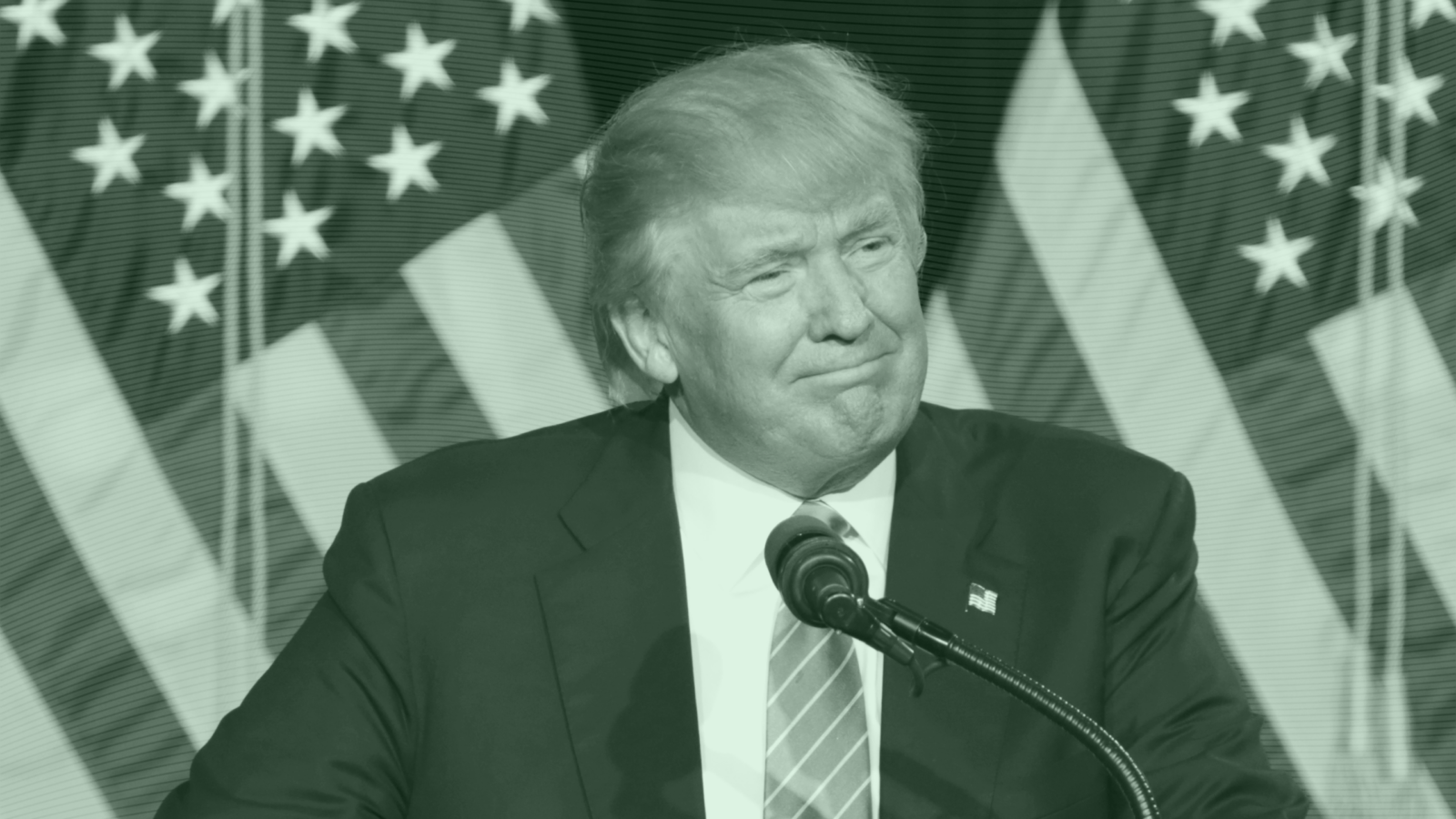Good morning.
That one burns a little. An LPL financial advisor has been suspended by FINRA for running a bourbon-tasting business. The advisor reportedly ran the side hustle while at Edward Jones between 2014 and 2022, without ever giving written notice or getting approval. We’d have given him a pass since he’s based in Kentucky, but late last month, he agreed to a two-month suspension and a fine.
The advisor neither admitted to nor denied the findings, but the moonlighting whiskey connoisseur must know the outside business operations were a pour choice.
Ahead of Trump 2.0, Advisors Dig into Policy

The whole “Trump Trade” thing is in full effect.
The markets jumped Wednesday as investors reacted to the news of a second term for President-elect Donald Trump. Stock futures soared, Treasury yields edged higher, and the dollar rose to its strongest level in a year. While markets generally tick up after close elections, investors seem to believe Trump 2.0 will help spur growth and ease regulation. But, for some advisors, there are still meaningful questions that need answers — especially around the particulars of his tax policies.
“There is a lot of uncertainty,” said Brian Spinelli, co-CIO at Halbert Hargrove. “Post-election, we are looking for more detail.”
They’re Eating the Tax
Advisors are pointing to the Tax Cuts and Jobs Act, a first-term Trump-era rule that changed deductions and tax credits for businesses, which is set to expire after next year. An increase in personal and corporate taxes, reduction in deductions, and a massive decrease of the estate tax exemption could take a toll on long-term and tax planning, according to Sean Williams, CFP, an advisor with Cadence Wealth Partners in North Carolina.
Republicans also took control of the Senate, giving the GOP the upper hand in tax and spending stand-offs on Capitol Hill, which will likely loom large over future policy. “The real impactful story to watch is TCJA,” he told The Daily Upside.
Born to Run. Taxes aside, the stock market is on a tear, and traders are already getting out their track shoes. They expected the market to have more room to run after a Trump win, according to an October Bloomberg survey:
- Almost 6 in 10 respondents anticipate the markets will perform better than they currently are performing under a Trump administration.
- The price of bitcoin is expected to rise to a new record above $80,000 by year-end.
- About a year from now, some 57% of respondents said they expect the price of gold to be higher under Trump.
“Trump is pro-growth, so overweighting a portfolio towards the US may not be a bad idea,” said Ashley Folkes, a CFP and planner with Farther. Small-cap stocks in sectors like manufacturing, industrials, and technology could be the biggest winners.
Playing the Trump Card. With the stock market at an all-time high, it could also be the time to use tax strategies, like donor advised funds, to help rebalance gains, said Jeremy Keil, a planner with Keil Financial in Wisconsin. “I’ve seen more people lose money by changing their portfolio because of politics than make money,” he told The Daily Upside. Still, “with stocks up and bonds sideways, you may have a lot more risk than you thought you did.”
The Advisor’s Ultimate Toolkit to Planning Success
Transparency, input into your investment plans, and 24/7 access to their financial information… Just a few client requests you might be familiar with as a financial advisor.
2025 is only six weeks away, and there has never been a better time to consider elevating your business strategy to deliver the ideal planning experience (and meet your clients’ ever-growing list of requests).
This comprehensive set of guides includes 44 questions to spark productive conversations on both financial and non-financial topics, three workflows to help you streamline the notoriously challenging onboarding process, and a checklist for creating engaging financial planning experiences.
Franklin Templeton Doubles Down on Alts
Alternatives are going mainstream.
With investor interest in the asset class skyrocketing, Franklin Templeton is staking its claim as a top name in the alternative investing space, which is now expected to top almost $30 trillion by 2029. The San Mateo, California-based asset manager created a new executive position in its Wealth Management Alternatives business this week and poached George Stephan, a top executive who previously worked at KKR and Morgan Stanley.
“There’s so much activity on the private side now that you really just can’t ignore it if you want a diversified portfolio,” said Jacob Miller, co-founder of private markets investment platform Opto Investments.
Alt Vibes?
The new role is tapping growing demand for new alt products from financial advisors. This year, more than half of RIAs and independent broker-dealers said they would recommend non-traded alternative investments, up from just 25% in 2020, according to CNL Securities’ 2024 survey.
Over the past decade, an advisor looked like a “genius” for holding low-cost, 60/40 portfolios, said Miller. Not anymore. “Once inflation and Fed interest rates increased, it was like the tide went out and that portfolio wasn’t wearing shorts,” he said.
Private credit is emerging as one of the more attractive segments, according to a Morgan Stanley report. The research also found:
- At the start of this year, private credit accounted for roughly $1.5 trillion in assets worldwide.
- Private credit is expected to become a $2.8 trillion asset class globally by 2028.
Ctrl+Alt. Franklin Templeton has grown to be one of the largest managers of alternative assets globally; it’s acquired multiple alt firms since 2018, including Benefit Street Partners, Lexington Partners, and Clarion Partners. As of this June, alternatives made up roughly 16%, or $264 billion, of Franklin Templeton’s $1.65 trillion in AUM. “We have been deliberate about building our capabilities,” Franklin Templeton EVP Adam Spector said in a release.
There are definitely some gaps Franklin Templeton could fill as plenty of the mega-firms are still trying to crack the alternatives code, Miller said. Fidelity is a relative newcomer, with about $70 billion in alternative assets under administration as of March. Vanguard liquidated its Alternative Strategies Fund last year.
ETFs Have Dominated for Decades. What’s Next?

ETFs are like Pringles: Once you pop, you just can’t stop.
Exchange-traded funds have been steadily chipping away at the market share of the almighty mutual fund, and after roughly 30 years, now make up almost 30% of total invested assets in the US. The latest product developments, like new share classes and crypto funds, are adding to the popularity and giving investors more options. It’s safe to say that in the next two decades the asset split could be closer to half, according to ETFGI founder Deborah Fuhr.
“It’s one of these things where once you try ETFs, you tend to use them more and more,” she told The Daily Upside.
Extra Upside
- Case Closed: Ex-RBC advisor wins nearly $10 million in discrimination claim.
- In Vogue: Advisors will prefer model portfolios over multi-manager funds going forward, Cerulli finds.
- Advisor’s Ultimate Toolkit: Elevate your business strategy to deliver more plans to more clients. Drive growth with three easy-to-follow guides centered around building engaging financial planning services, questions to ask clients, and onboarding workflows. Download the toolkit.*
* Partner
ICYMI
- Digital-Friendly: Cryptocurrency was in high demand this election season, with BlackRock’s Bitcoin ETF as the clear winner.
- House CFO: More women are taking charge of their household finances and retirement.
- Stagflation: Advisors prepare for a slowing economy and growing wealth disparity.
Advisor Upside is edited by Sean Allocca. You can find him on LinkedIn.
Advisor Upside is a publication of The Daily Upside. For any questions or comments, feel free to contact us at advisor@thedailyupside.com.

